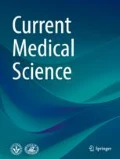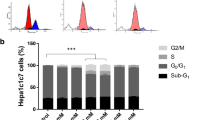Summary
To investigate the killing effect ofPNP/MeP-dR suicide gene system on hepatoma cells, pcDNA3. 0/PNP, an eukaryotic expression vector harboringE. coli PNP gene, was transfected into human hepatoma HepG2 cells by liposome-mediated method. A HepG2 cell line with stablePNP gene expression, HepG2/PNP, was established with presence of G418 selection. The cell growth curves were determined with trypan blue staining. The sensitivity of HepG2/PNP to MeP-dR and bystander effects were assayed by MTT and FCM methods. The enzymatic activity of the product ofPNP gene was determined by HPLC method. The cytotoxic effects of MeP-dR on HepG2/PNP cells were obvious (IC50=4.5 μmol/L) and all HepG2/PNP cells were killed 4 days after the treatment with 100 μmol/L MeP-dR. In mixed cultures containing increasing percentages of HepG2/PNP cells, total population killing was demonstrated when HepG2/PNP cells accounted for as few as 5% of all HepG2 cells 8 days after the treatment with 100μmol MeP-dR. High-pressure liquid chromatography (HPLC) demonstrated that thePNP enzyme could convert MeP-dR into 6-MP.PNP/MeP-dR suicide gene system had an advantage over traditional suicide gene systems for hepatoma gene therapy. Our e results suggest that high-level bystander effects of this system result in significant anti-tumor responses to hepatoma gene therapy, especiallyin vivo.
Similar content being viewed by others
References
Hughes B W, Wells A H, Bebok Zet al. Bystander killing of melanoma cells using the human tyrosinase promoter to express the Escherichia coli purine nucleoside phosphorylase gene. Cancer Res, 1995, 55(15): 3339
Gadi V K, Alexander S D, Kudlow J Eet al. In vivo sensitization of ovarian tumors to chemotherapy by expression of E. coli purine nucleoside phosphorylase in a small fraction of cells. Gene Ther, 2000, 7(20):1738
Cai X K, Lin J S, Liu Z Zet al. The constructions of pcDNA3.0/PNP-CD and pcDNA3.0/PNP and the detection of their expressions. Chin J Cancer Prev Treat (Chinese), 2004, 11(11):1125
Cai X K, Lin J S, Liu Z Zet al. Constructions of two vectors harboring PNP gene under the control of two different promoters and their expressions. World Chin J Digestol (Chinese), 12, (9):2036.
Sorscher E J, Peng S, Bebok Zet al. Tumor cell by-stander killing in colonic carcinoma utilizing the Escherichia coli DeoD gene to generate toxic purines. Gene Ther, 1994, 1(4):233
Hughes B W, King S A, Allan P Wet al. Cell to cell contact is not required for bystander cell killing by Escherichia coli purine nucleoside phosphorylase. J Biol Chem, 1998, 273(4):2322
McCart J A, Wang Z H, Xu Het al. Development of a melanoma-specific adenovirus. Mol Ther., 2002 6(4): 471
Rubsam L Z, Boucher P D, Murphy P Jet al. Cytotoxicity and accumulation of ganciclovir tri-phosphate in bystander cells cocultured with herpes simplex virus type 1 thymidine kinase- expressing human glioblastoma cells. Cancer Res, 1999, 59(3):669
Li Z, Shanmugam N, Katayose D,et al. Enzyme/prodrug gene therapy approach for breast cancer using a recombinant adenovirus expressing Escherichia coli cytosine deaminase. Cancer Gene Ther, 1997, 4(2):113
Gadi V K, Alexander S D, Waud W Ret al. A long-acting suicide gene toxin, 6-methylpurine, inhibits slow growing tumors after a single administration. J Pharmacol Exp Ther, 2003, 304(3):1280
Author information
Authors and Affiliations
Additional information
CAI Xiaokun, male, born in 1972, M.D., Ph.D.
This project was supported by a grant from the National Natural Science Foundation of China (No. 30330680).
Rights and permissions
About this article
Cite this article
Xiaokun, C., Junli, Z., Jusheng, L. et al. Experimental studies onPNP suicide gene therapy of hepatoma. Current Medical Science 25, 178–181 (2005). https://doi.org/10.1007/BF02873570
Received:
Published:
Issue Date:
DOI: https://doi.org/10.1007/BF02873570




